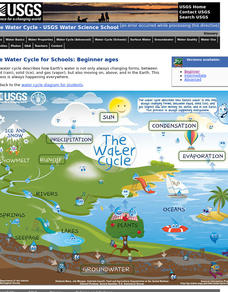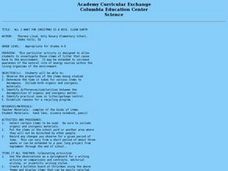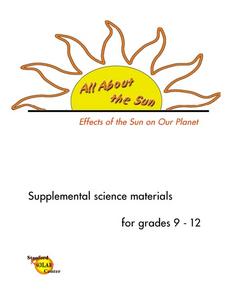Curated OER
Hazards: Third Grade Lesson Plans and Activities
Learners discover hazards related to volcanoes and predict the effects these hazards have on people and land. As blossoming geologists explore various volcanic eruptions, including the hazards associated with them, they...
K12 Reader
Rainforest Ecosystems
Rainforests are the topic of this brief reading passage. Learners can find out all about the different layers of the rainforest as well as the types of creatures that live there. After reading, they respond to five questions about the text.
Chicago Botanic Garden
Greenhouse Gas Emissions – Natural and Human Causes
Part three in the series of seven has pupils discussing the different greenhouses gases, learning about the carbon cycle, and then watching a short video about the carbon cycle. Based on their knowledge, individuals complete a greenhouse...
US Geological Survey
The Water Cycle for Schools: Beginner Ages
Explore a day in the life of a water droplet. An interactive infographic helps scholars learn how water cycles work from precipitation all the way around to condensation. Learners hover over each step of the cycle to read more as they...
Curated OER
Radiation Comparison Before and After 9-11
Using the NASA website, class members try to determine if changes could be detected in cloud cover, temperature, and/or radiation measurements due to the lack of contrails that resulted from the halt in air traffic after the attacks...
Curated OER
Volcanoes: First Grade Lesson Plans and Activities
Introduce young geologists to types of volcanoes during the pre-lab. First graders explore how different liquids flow with an experiment on viscosity to simulate how different types of lava flow. Next, they learn...
Rainforest Alliance
Investments in Forest Carbon
One hundred metric tons of CO2 can accumulate in one acre of forest over time—that's a lot of carbon! In the activity, groups of middle school learners determine what makes forests important. They then solidify the concept by using a...
Texas State Energy Conservation Office
Investigation: Automotive Emissions and the Greenhouse Effect
It is recommended that you conduct this fabulous experiment as a whole-class demonstration. Collect air samples from the environment, human exhalation, and car exhaust, then compare them for carbon dioxide content using bromthymol blue...
Orange County Water Atlas
Location, Location, Location…
Young geographers discover not only how to read and recognize coordinates on a map, but also gain a deeper understanding of latitude and longitude and how climate changes can vary significantly across latitudes.
Virginia Department of Education
Determining Absolute Age
How can radioactive decay help date old objects? Learners explore half-life and radioactive decay by conducting an experiment using pennies to represent atoms. Young scientists graph data from the experiment to identify radioactive decay...
Curated OER
Earthquakes: Fifth Grade Lesson Plans and Activities
After learning about P waves and S waves, fifth graders view the intensity of earthquakes by examining seismographs and images of earthquake damage. Young scientists then forecasting future quakes by analyzing data about...
K12 Reader
Plants Are Producers
Here's a handy two-part instructional activity that uses an article about plants to assess reading comprehension. After reading the passage, kids answer questions based on the information in the text.
Curated OER
Reading Comprehension 4
Ever needed a reason to stop eating meat? Read this interesting (and slightly disgusting) passage with your class to assess reading comprehension.
United Nations
Compost Monitor Training
What should go in the trash, and what can be composted? Guide your young conservationists through the process of composing their trash with a lesson about the different ways we can dispose of garbage. Using a trash bag with clean...
Teach Engineering
Earthquakes Living Lab: The Theory of Plate Tectonics
Find out if your class agrees with Ice Age: Continental Drift ... or if it's just a fun family movie! Class members research the theory of continental drift, examine evidence of plate tectonics, connect...
Cmassengale
Bacteria: Structure and Function
For as small as they are, there sure is a lot of information for young scientists to learn about bacteria. Help simplify the subject with this instructional presentation that explores the structure, nutrition, and reproduction of...
Curated OER
The Chemistry Connection
In this proteins instructional activity, students read about the chemical compound, protein. Students determine where proteins are found in the body and how enzymes help the body react. Then students complete 3 short answer questions.
Curated OER
The Chemistry of Coal
Students investigate the chemistry of coal. This lesson serves as a review of conservation of mass, simple reactions and equation balancing. During the lesson, students research chemical components of coal, as well as environmental...
Curated OER
Studying Shadows
Students measure shadows and explore the altitude of the sun. In this sun lesson plan students will graph the length of shadows and solar altitude against time.
Curated OER
All I Want for Christmas is a Nice, Clean Earth
Students observe properties of items, determine time it takes for organic/inorganic items to decompose, identify differences/similarities between decomposition, identify practical uses in litter/garbage control, & establish reasons...
Curated OER
Reasons for the Seasons
Students discover how the Earth's axis of rotation affects the angle of sunlight and the length of day. They take a survey and give the survey out to family members and friends. They tally their findings and then determine the correct...
Curated OER
Effects of the Sun on Our Planet (Grades 9-12)
Students examine the Earth's magnetosphere and observe the effects of the sun's energy on it. They discover the difference between true north and magnetic north. They also explore how solar cells convert solar energy to electricity.
Curated OER
The State of the Planet
Students address four different environmental topics (water issues, the threat of food shortages, human population growth, and global warming) as they watch a film and discuss the future of the earth. In groups, they complete various...
Curated OER
Urban Changes
Students explore how landscapes undergo constant changes with urban development. They plan and build their own "city" by including features that have minimal resource demands to sustain the city itself.

























